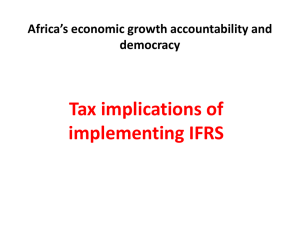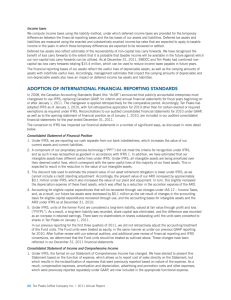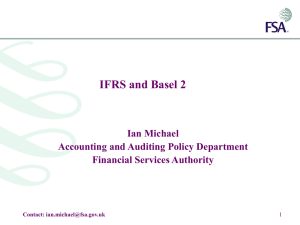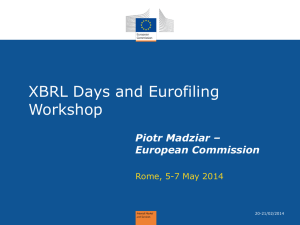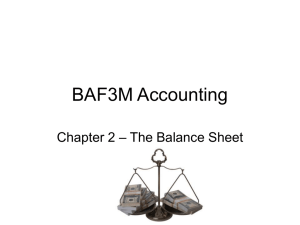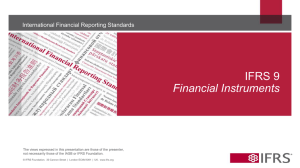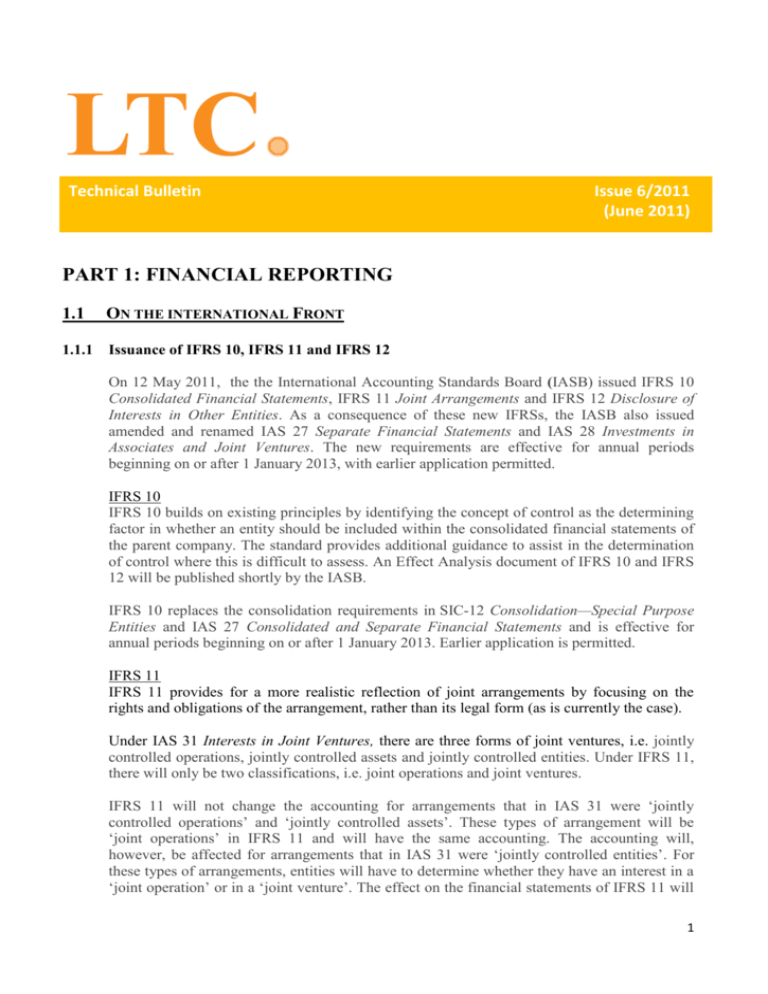
Technical Bulletin
Issue 6/2011
(June 2011)
PART 1: FINANCIAL REPORTING
1.1
ON THE INTERNATIONAL FRONT
1.1.1
Issuance of IFRS 10, IFRS 11 and IFRS 12
On 12 May 2011, the the International Accounting Standards Board (IASB) issued IFRS 10
Consolidated Financial Statements, IFRS 11 Joint Arrangements and IFRS 12 Disclosure of
Interests in Other Entities. As a consequence of these new IFRSs, the IASB also issued
amended and renamed IAS 27 Separate Financial Statements and IAS 28 Investments in
Associates and Joint Ventures. The new requirements are effective for annual periods
beginning on or after 1 January 2013, with earlier application permitted.
IFRS 10
IFRS 10 builds on existing principles by identifying the concept of control as the determining
factor in whether an entity should be included within the consolidated financial statements of
the parent company. The standard provides additional guidance to assist in the determination
of control where this is difficult to assess. An Effect Analysis document of IFRS 10 and IFRS
12 will be published shortly by the IASB.
IFRS 10 replaces the consolidation requirements in SIC-12 Consolidation—Special Purpose
Entities and IAS 27 Consolidated and Separate Financial Statements and is effective for
annual periods beginning on or after 1 January 2013. Earlier application is permitted.
IFRS 11
IFRS 11 provides for a more realistic reflection of joint arrangements by focusing on the
rights and obligations of the arrangement, rather than its legal form (as is currently the case).
Under IAS 31 Interests in Joint Ventures, there are three forms of joint ventures, i.e. jointly
controlled operations, jointly controlled assets and jointly controlled entities. Under IFRS 11,
there will only be two classifications, i.e. joint operations and joint ventures.
IFRS 11 will not change the accounting for arrangements that in IAS 31 were „jointly
controlled operations‟ and „jointly controlled assets‟. These types of arrangement will be
„joint operations‟ in IFRS 11 and will have the same accounting. The accounting will,
however, be affected for arrangements that in IAS 31 were „jointly controlled entities‟. For
these types of arrangements, entities will have to determine whether they have an interest in a
„joint operation‟ or in a „joint venture‟. The effect on the financial statements of IFRS 11 will
1
depend on this determination and on the accounting method that the entity was using for its
jointly controlled entities in IAS 31. So, for example, if the entity was accounting for its
„jointly controlled entity‟ using proportionate consolidation and the arrangement will, under
IFRS 11, be a „joint operation‟, the changes will be minimal or none. But if this same „jointly
controlled entity‟ was being accounted for using the equity method, the entity will have to
change from the equity method to accounting for assets and liabilities. Conversely, if the
entity was accounting for its „jointly controlled entity‟ using proportionate consolidation and
this arrangement is now a „joint venture‟, that entity will have to change the accounting for
the arrangement from proportionate consolidation to the equity method.
IFRS 11 supersedes IAS 31 and SIC-13 Jointly Controlled Entities—Non-monetary
Contributions by Venturers. The effective date of IFRS 11 is for annual periods beginning on
or after 1 January 2013. Earlier application is permitted. If an entity applies IFRS 11 earlier, it
must disclose that fact and apply IFRS 10, IFRS 12, IAS 27 Separate Financial Statements
and IAS 28 Investments in Associates and Joint Ventures at the same time.
IFRS 12
IFRS 12 is a new and comprehensive standard on disclosure requirements for all forms of
interests in other entities, including subsidiaries, joint arrangements, associates and
unconsolidated structured entities.
IFRS 12 is effective for annual periods beginning on or after 1 January 2013. Earlier
application is permitted.
Click here to view the interaction between IFRS 10, 11 and12.
1.1.2
Issuance of IFRS 13
On 12 May 2011 the IASB issued IFRS 13 Fair Value Measurement. IFRS 13 defines fair
value, sets out in a single IFRS a framework for measuring fair value and requires disclosures
about fair value measurements. IFRS 13 applies when other IFRSs require or permit fair value
measurements. It does not introduce any new requirements to measure an asset or a liability at
fair value, change what is measured at fair value in IFRSs or address how to present changes
in fair value. The new requirements are effective for annual periods beginning on or after 1
January 2013, with earlier application permitted.
1.2
SINGAPORE
1.2.1
FSRC Observations – 1 Jan 2010 to 31 Dec 2010
The Financial Statements Review Committee of the Institute of Public Accountants of
Singapore has compiled a list of frequently occurring non-compliance points based on its
review of audited financial statements.
Please click http://www.icpascfr.org.sg/wp-content/uploads/2010/02/FSRC-Findings-20102011.pdf for more details.
2
1.2.2
ASC’s Advice on the Accompanying Note to INT FRS 115
The Accounting Standards Council (ASC) issued the INT FRS 115 Agreements for the
Construction of Real Estate in August 2010. The ASC also issued an Accompanying Note
with INT FRS 115 (Accompanying Note), which distils the ASC‟s considerations in reaching
its consensus on the accounting treatment for the sale of uncompleted residential properties
“off-plan” in Singapore. The Accompanying Note is an integral part of INT FRS 115 and is to
be read together with the interpretation.
As the Deferred Payment Scheme (DPS) is not covered in the scope of the standard form of
the Sales and Purchase Agreement (SPA) prescribed under the Housing Developers Rules, the
Accompanying Note does not specifically address the accounting treatment of a SPA with a
DPS feature. Accordingly, the ASC advises that all the criteria set out in FRS 18 and INT
FRS 115 should be carefully analysed to ensure that the requirements for applying the
percentage of completion method for revenue recognition purposes are met for SPAs with a
DPS feature. The ASC also advises that a proper analysis should be performed on whether the
concepts articulated in the Accompanying Note can be extended to SPAs with a DPS feature.
PART 2: AUDITING AND ASSURANCE
2.1
IAASB Seeks Global Views on Enhancing the Value of Auditor Reporting
On 16 May 2011, the International Auditing and Assurance Standards Board (IAASB)
released its consultation paper, Enhancing the Value of Auditor Reporting: Exploring Options
for Change, to obtain views on enhancing the quality, relevance and value of auditor reporting
on an international basis.
The consultation paper seeks to determine whether there are common views among users of
audited financial statements and other stakeholders about the usefulness of auditor reporting.
It describes issues with current financial reporting, including a perceived “information gap,”
identified by some stakeholders. It then sets out possible options for change and seeks input as
to whether such options might be effective in enhancing auditor reporting and the
communicative value of the auditor‟s report.
The IAASB is also seeking information about the potential implications of changes in auditor
reporting, as well as about possible implementation challenges. The paper recognises that not
all of the options explored are able to be implemented by the IAASB on its own—some would
require collaboration with national standard setters, regulators and/or legislators to develop or
implement.
The IAASB invites all stakeholders to respond to its consultation paper. To access the
consultation paper or submit a comment, visit the IAASB‟s website at
http://www.ifac.org/Guidance/EXD-Details.php?EDID=0163
Comments on the Consultation Paper are requested by 16 September 2011.
3
2.2
IAASB Issues Enhanced Overarching Assurance Standard For Comment
On 29 April 2011, the IAASB released for public comment, a proposed revised International
Standard on Assurance Engagements (ISAE) 3000, Assurance Engagements Other Than
Audits or Reviews of Historical Financial Information.
The proposed revised ISAE 3000 is a principles-based standard that can be applied effectively
to a broad range of assurance engagements. Such engagements may range from assurance on
statements about the effectiveness of internal control, for example, to direct engagements such
as performance or “value for money” audits, to possible future engagements addressing
integrated reporting or corporate social responsibility reporting.
The proposed revised ISAE 3000 covers both reasonable and limited assurance engagements.
Among other proposals, the revised ISAE introduces guidance designed to help readers better
understand these two levels of assurance. It also includes guidance addressing direct
engagements that have become common in the public sector and have been undertaken
increasingly in the private sector.
The proposed revised ISAE 3000 also includes material from the existing International
Framework for Assurance Engagements that is necessary for the revised ISAE to be
understood without reference to the Framework. Accompanying the exposure of the proposed
revised ISAE are also proposed consequential amendments to the Framework reflecting the
impact of the proposals in revised ISAE 3000.
The IAASB invites all stakeholders to comment on its proposals. To access the exposure draft
or submit a comment, visit the IAASB‟s website at http://www.ifac.org/Guidance/EXDDetails.php?EDID=0161
Comments on the Consultation Paper are requested by 1 September 2011.
PART 3: TAXATION
3.1
Singapore and Spain Sign Agreement for Avoidance of Double Taxation
Singapore and Spain signed an Agreement for the avoidance of double taxation (DTA) on 14
April 2011. The DTA incorporates the internationally agreed Standard for the exchange of
information for tax purposes, upon request.
Please click here for more details.
3.2
Revision of e-Tax Guide on Machinery and Plant: Section 19/19A of the Income Tax Act
This Guide provides guidance on what constitutes plant for the purposes of claiming capital
allowances under section 19 or 19A of the Singapore Income Tax Act (ITA). It is intended to
provide greater clarity and certainty on what Comptroller would accept as plant for purposes
of claiming capital allowances.
Please click the following for more details:
http://www.iras.gov.sg/pv_obj_cache/pv_obj_id_D0DB90A8D4BAC6B2BDD6F3945591C4
9F02BD0200/filename/Eguide%20on%20Machinery%20and%20Plant.pdf
4
3.3
Tax Treatment of Operating Lease Income Under FRS 17 Leases
Under the existing tax rules, rental income derived by a taxpayer under an operating lease is
subject to tax on an accrual basis (i.e. when the rental income becomes due and payable under
the lease agreement). However, Financial Reporting Standard (FRS) 17 Leases requires lease
income from operating leases to be recognised on a straight-line basis over the lease term to
reflect the time pattern of the user‟s benefit. The Comptroller of Income Tax has received
requests from taxpayers to allow reporting of rental income for tax purposes based on the
effective rent method instead of accrual basis to minimise tax adjustments.
Please click here for the IRAS release.
3.4
Sole Proprietor Jailed for Under-Reporting Profits
Tax evasion is a criminal offence that attracts severe penalties. Businesses and individuals
should come forward to report past tax evasion to IRAS immediately. IRAS will treat such
disclosure as a mitigating factor when considering the penal charges.
Please click here for more details.
PART 4: REGULATORY & BUSINESS
Companies Act primed for a major facelift
On 25 May 2011, the Business Times reported that more than 200 proposed changes to the
Singapore Companies Act were submitted to the Finance Ministry in April 2011, according to
steering committee head Mr. Walter Woon.
Amongst the proposed changes are:
No codification of directors‟ duty
Extend the use of statutory derivative action to listed companies. This effectively
allows shareholders to sue directors for a breach of duty - something they cannot do
under the current Act.
Custodian banks and nominee companies which hold shares on behalf of CPF or
institutional investors be able to grant more than two AGM proxies which is the
current limit.
Exempt 'small companies' from accounts filing, currently only provided for firms
known as exempt private companies. This reform, which would affect about half of all
companies in Singapore - defines a small firm as one that fulfils two out of three
requirements: its revenue and gross assets must not exceed $10 million, and it must
not hire more than 50 employees.
5
Contact Us
For further information on this bulletin, please contact our Quality Control Advisory department as follows:
Andrew Chua
Head of Technical and Training
Tel: 66038257 (DID)
Email:andrewchua@ltc-cpa.com
Ramchand Jagtiani
Partner
Chief of Operations (Quality Control)
Tel: 66038221 (DID)
Email:rnjagtiani@ltc-cpa.com
LTC LLP
Certified Public Accountants
1 Raffles Place
#20-02 One Raffles Place
Singapore 048616
Tel: 62260080 (General Line)
Disclaimer Statement
1. This bulletin contains general information only and LTC LLP is not, by means of this document, rendering any
professional advice or services. This bulletin is not a substitute for such professional advice or services, nor should it
be used as a basis for any decision or action that may affect your business. Before making any decision or taking any
action that may affect your business, you should consult a professional advisor.
2.
Whilst every care has been taken in compiling this bulletin, LTC LLP makes no representations or warranty
(expressed or implied) about the accuracy, suitability, reliability or completeness of the information for any purpose.
3.
LTC LLP, its employees or agents accept no liability to any party for any loss, damage or costs howsoever arising,
whether directly or indirectly from any action or decision taken (or not taken) as a result of any person relying on or
otherwise using this publication or arising from any omission from it.
Copyright
Copyright © June 2011 by LTC LLP. All rights reserved. No part of this bulletin may be reproduced, stored in a retrieval
system, or transmitted in any form by any means, electronic, mechanical, photocopying, recording or otherwise, without
prior written permission from LTC LLP.
Permit No: MICA (P) 238/07/2010
Audit • Advisory • Valuation • Investigation
Independent Member of BKR International
LTC LLP is an accounting limited liability partnership. LLP UEN: T08LL0811J
6

